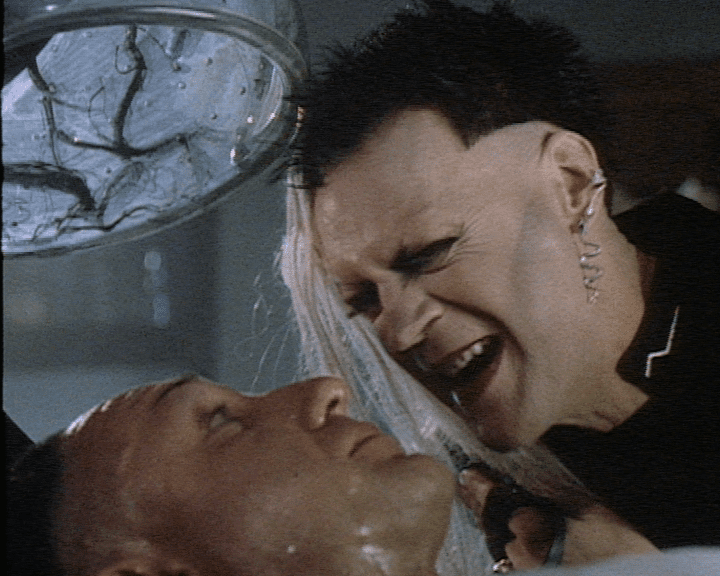Sons of Steel (1988) is unlike anything I’ve ever seen before. Rude, crude and obnoxious, the cult classic is currently enjoying a run of screenings at the Fantastic Film Festival. It’s billed as “the last great Australian post-apocalyptic/heavy metal action sci fi”, a description that, if anything, sells it short. Sons of Steel is a marvel of Australian film making, a criminally forgotten treasure with a political undercurrent that is more relevant than ever.
It follows the exploits of Black Alice, heavy metal superstar and violent leader of an anti-nuclear peace movement in future Sydney. Alice is turned into a hologram by the facist government ruling Australia, and awakens in the future to discover that his pro-peace movement has inadvertently caused the nuclear destruction of the world. He travels back in time to avert the disaster, with only an hour to do so.
Sons of Steel is entirely unconcerned with good taste. By contemporary liberal standards, it would probably be considered problematic. When I speak with director Gary Keady, and tell him how delighted I was with how rude the film was, he laughs. “That’s heavy metal, isn’t it — heavy metal tells it how it is. It says ‘fucking stop it’ instead of beating around the bush. That’s what I’ve been proposing all along with the character. He tells it like it is.”
The film has a distinct socialist undertone, one that Keady says he can’t help. Black Alice’s aggressive personal philosophy of “peace or I’ll punch your lights out” is one that is gradually gaining favour amongst the general public, as more people become aware of the ills of the capitalist society we live in. As Keady tells me, “It speaks of things that are still apparent- in terms of its reference to the fascism that is fought against in the film and the government oppression which is still faced around the world today.”
There is an eerily familiarity to the Sydney represented in Sons of Steel, one that pushes beyond the aesthetics of the film. As locations in the film are unmistakably Sydney, the political repression in our dystopian future city is also acutely recognisable. Government surveillance and interference in the actions of Black Alice are not unlike the experiences of climate activists in our current era. Gary sympathises with this comparison. “I feel that if I can say anything today, it’s that it’s time to stand up and shout it out harder than ever before that we’re destroying this globe and we have to do something about it. It’s run by capitalist dollars trying to stop us so that they can maintain this fossil fuelled world.”
As Peter Dutton advocates for further surveillance of left-wing activists by ASIO, the plot of Sons of Steel is uncanny in its relevance. Keady has already written eight books as a follow up to the original film, books that were written in reaction to the political apathy he found when he returned to Australia after a prolonged, self-imposed banishment. “Black Alice is everything we used to stand for that’s just been sanitised out of the community. You can still find it in parts of Europe, where people are still angry…but here they’ve been slowly brainwashed, to the point that the aggression that was our values in the 60’s and 70’s and 80’s has gone.”
Sons of Steel first premiered in the latter years of the Cold War. Though comparisons of the state of world affairs between then and now are increasingly prevalent, there is also a promising similarity in the growing global resistance to oppression: no more so than in the fight against climate change. Sons of Steel has never been more relevant.
Sons of Steel will be screening at the Ritz Cinemas in Randwick this Thursday at 6:30pm, followed by a post screening Q&A with the director and cast. You can purchase tickets here.
For futher information, visit the film’s website.





